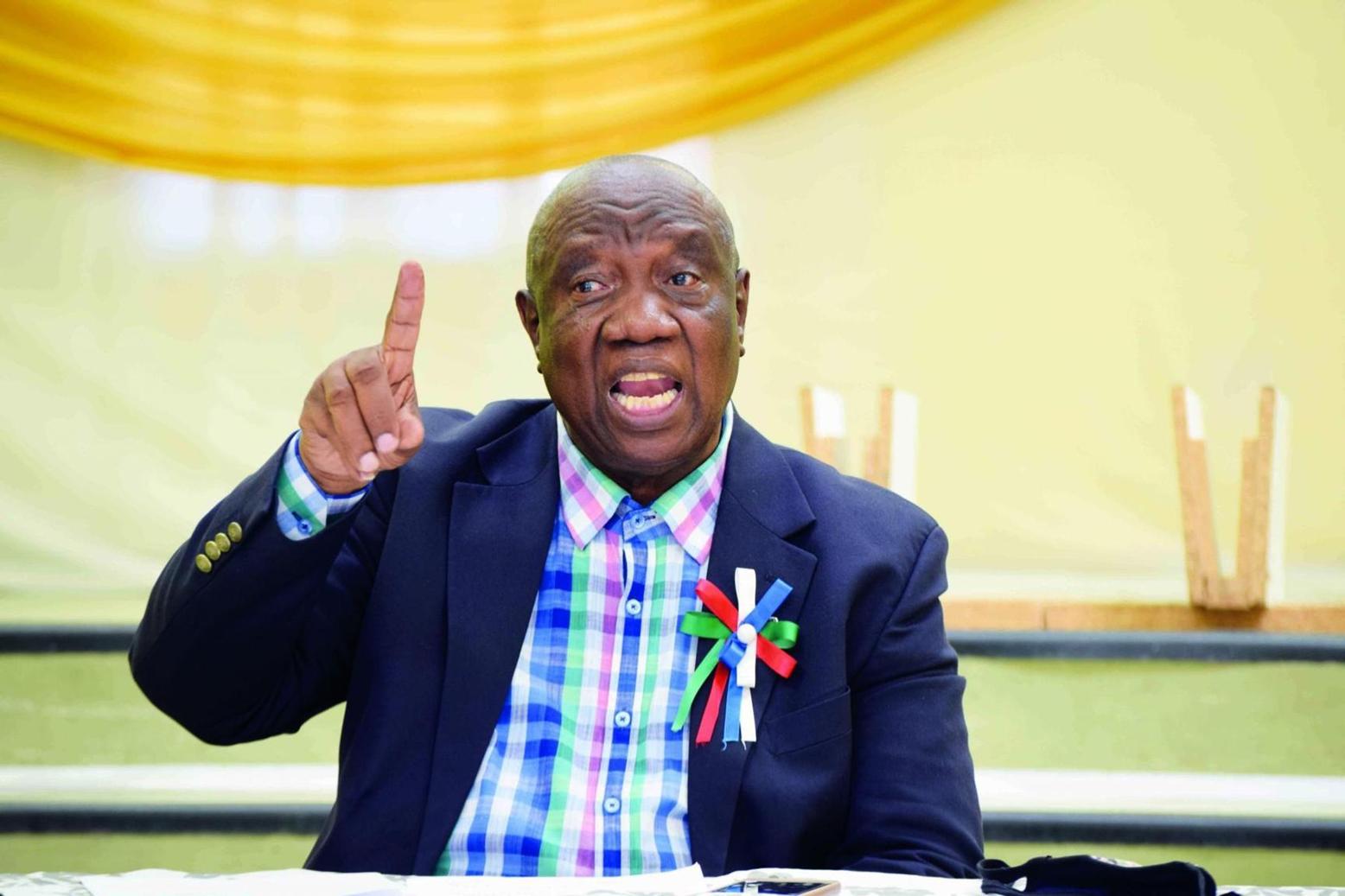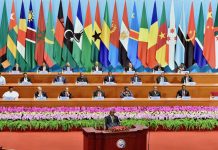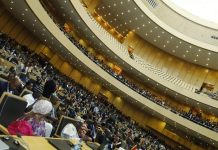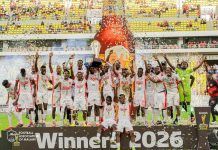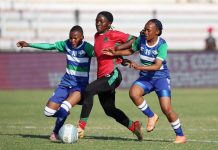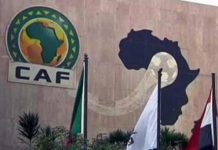Africa-Press – Lesotho. Goes for Machesetsa Mofomobe, rival contender for BNP leadership
Lesojane Leuta, one of the six contenders vying for the coveted post of Basotho National Party (BNP) leader, has come out guns blazing, tearing into his main competitor, the party’s deputy-leader and Deputy Minister Foreign Affairs, Machesetsa Mofomobe, for reckless speech.
He further accuses Lesotho’s premier, Dr Moeketsi Majoro and his deputy, Mathibeli Mokhothu, of endorsing Mofomobe’s utterances “because they have failed to rein him in by keeping silent.
In an exclusive one-on-one interview with Public Eye on Tuesday this week, Leuta, who describes himself as a seasoned politician and BNP veteran worth occupying the party’s high office, did not mince his words.
He also lambasts the National Peace and Unity Bill, 2021, borne as a result of the infamous Clause 10, chastising its proponents for attempting to violate and undermine Lesotho’s judicial system “merely to protect some favoured individuals.
Leuta also speaks on divisions in the BNP, which he maintains came to a head during outgoing leader Chief Thesele ’Maseribane’s 10-year tenure at the helm of a political entity founded in 1959 by the late former Prime Minister Leabua Jonathan.
According to Leuta, despite its rich history the BNP needs resuscitation which it can only get in the hands of a leader of the mold of Jonathan or one embodying the characteristics of Jonathan’s successor, the late Chief Retšelisitsoe Sekhonyana. Below are excerpts from the interview with BONGIWE ZIHLANGU:
PUBLIC EYE (PE): You have previously served in the BNP NEC as Secretary-General where you fell out with your colleagues leading to victimisation, a litany of court cases, suspension, expulsion and subsequently reinstatement of your membership without any preconditions via a court order.
What prompted you to campaign for the BNP leadership post? LESOJANE LEUTA (LL): I looked at all the people who threw their hats into the ring to contest for the BNP leadership and thought if that was all the BNP could offer, I can also try my luck, especially because there is such an outcry in the country, across all social media platforms and in the airwaves that this country has a leadership crisis.
But I am of the opinion that the BNP has something to offer and that which it can offer has to come from a competent leader. I am confident that if I succeed, I can bring the party to the point where the people of Lesotho will have confidence again in the political system.
PE: There are six of you now competing for the coveted post.
What do you think sets you apart from the rest? LL: I have the longest experience within the BNP, way more than my competitors. I have served within the structures of the party much longer than any of them.
I have held a position of responsibility when I was the Secretary-General which exposed me to the inner workings of the party. I know the strengths and weaknesses of the party and I think I have developed strategies on how to bring it to the stage where it becomes a strong competitor for power in Lesotho.
Moreover, these competitors do not have the experience I have in the workings of the governance systems of the party. They may have experiences elsewhere, but when it comes to the functioning of government and the economic side of things, I’m way ahead of them.
I have held positions of responsibility within the Central Bank of Lesotho (CBL) for over 30 years. I have held positions of responsibility and the experience and exposure I got there, none of them have it.
I think the crowning moment for me was when I was able to increase the tally of votes from 23 000 to 31 000 as Secretary-General. Another crowning moment was working so hard as to secure the Mt Moorosi constituency for the leader of the party, which had evaded him throughout his tenure. I am the only SG who enabled him to win a constituency.
PE: What kind of a leader would you say the BNP needs now?
LL: BNP needs a leader who can at least match the abilities of the founding leader and former Prime Minister Chief Leabua Jonathan or a leader of the mold of the late Ntate Retšelisitsoe Sekhonyana, someone who can bring people together and not divide them. Someone with the ability to listen to the membership of the party and try to include them in decision-making, which I think is lack has been lacking.
PE: Since being given the green light to campaign for the BNP leadership, you have on several occasions lamented the state of blatant discrimination within the party.
Can you elaborate on that? LL: Discrimination within the party was rampant and remains. We have people in leadership who prefer certain individuals over others.
They can dish out jobs to certain individuals because they are their favourites while depriving those who aren’t. It manifests itself in the dishing out of political posts.
That’s where discrimination is evident and they don’t care whether the person being given a job possesses the ability to carry out the work. If they want someone to hold a post in the NEC or constituencies, they just force it down by hook or crook, regardless of the consequences.
PE: What would you say has gone wrong with the BNP in the 10 years that Chief Thesele ’Maseribane has been at the helm?
LL: A lot of things have gone wrong over the past 10 years although the party has not suffered as many splits as other parties. But during Morena Thesele’s tenure, we saw the party split after the controversial 2016 national executive committee elections held at Ladybrand, South Africa.
We lost a chunk of support to the Democratic Party of Lesotho (DPL) and other parties. A lot has gone wrong and the pain is being manifested with complaints all over the media.
The membership are complaining about the shabby manner in which they are being treated by their elected officials and discrimination in the distribution of political posts.
It’s a myriad of things that have gone wrong. That is why all the contenders, wherever they go except for one, people complain about being neglected, abandoned. Leaders are just there for their own sakes.
PE: You complain about the BNP being part of governments in which it is not instrumental in decision-making, vowing that under your leadership you would never entertain such should you be part of any future coalition government.
Can you unpack that? LL: My thinking in that regard is motivated by the fact that during Lesotho’s first coalition government, the so-called ‘Letsema’, when it became evident at some point that the partners had fallen out and we needed facilitation from outside, South Africa was already in.
So, from the BNP corner we had proposed that other people should join the South African delegation. We requested that we should get someone from the SADC Head Office.
We had also proposed to get someone from the Commonwealth and that body had already agreed since Dr Rajen Prassad’s assignment was running out in New Zealand, they would be willing to assign him to Lesotho.
But because we had no say in that government our request for tripartite representation in the facilitation team could not materialize and we are now stuck with South Africa only.
The party and I didn’t want this. We should not be part of a government where our contribution is undermined. During the previous Thomas Thabane-led government called ‘4 by 4’, the same thing happened. We as the membership of the party had the feeling that the leader of the BNP (Thesele ‘Maseribane) was being set-up for failure.
He was appointed coordinator on several occasions, from the factory workers’ strike over wages, the Wool and Mohair saga, coordinator of Lesotho teachers’ salary fiasco, as well as chairman of the Covid-19 Command Centre.
All these controversial undertakings were assigned to him and he accepted. The membership of the party was not satisfied but they couldn’t do anything about it.
So I’ve made up my mind that if I succeed, BNP will never be part of a government where our voice is muffled and not a single policy of the BNP can be implemented. No, I cannot agree to that and I’m sure the membership of the BNP would allow this again.
PE: Recently, the US Embassy to Lesotho moved some of its key services such as the issuing of visas to its Pretoria mission in South Africa, thus creating in Basotho’s minds the school of thought that Lesotho has been downgraded.
What could have prompted the US to take such a drastic step? Do you think some of our politicians might have recklessly antagonized the Americans?
LL: This is my personal view, correct or not, I think this latest decision is but one in a litany of distressing news from the Americans. First, we were downgraded to tier three by the Millennium Challenge Corporation (MCC) in 2020.
Then there was this issue of human trafficking which I don’t think was handled in the best manner possible. Because of what I know, I have a suspicion that the US Embassy is just being polite not to point out that the government has not done enough in dealing with that human trafficking matter.
Again, Lesotho was declared a rogue state by the same Americans. I think the cumulative effect of these negative decisions that are being taken against the government, might have had a play in the decision now to downgrade Lesotho to this level where we are forced to seek certain services from South Africa.
Maybe diplomatically it may not be possible for Americans to say so. I may not be correct but that is my thinking. And to crown it all, the reckless utterances by the Deputy-Leader of the BNP during his campaigns, could have influenced this decision.
I think his utterances were unduly and unnecessarily provocative to the development partner who has been with this country for more than 50 years. Lesotho is where it is today because of the assistance that we got from the US. And, to take pleasure with new friendships to the extent you can start to bath-mouth and antagonize the U. S. in that fashion, was not helpful.
PE: You harbor concerns regarding the manner lacking in transparency that the finances and assets of the BNP are being utilized by the current leadership and how that adversely affects the party’s membership.
Can you share your concerns in that regard?
LL:
For a long time, which I can trace to as far back as 2013 until 2019, the party membership at regular conferences has never been given an appropriate financial statements.
In terms of the BNP constitution, at conferences normally the leader, secretary-general and treasurer give out reports. But respective treasurers have never given comprehensive and acceptable financial reports.
This is why during the annual general meeting in 2018 at Thaba-Tseka, the conference rejected the financial statements that were presented to the conference. The leader and NEC had then promised that the conference would reconvene after two months to submit the corrected report.
But that was never done until when we went to Mazenod to elect a new executive committee, where were served with the shabbiest financial report I have ever seen.
Since 2013 the BNP has never been transparent with the manner in which the party’s finances are being handled. And that is one of the main complaints.
There’s that feeling within the membership that the party needs a different breed of leadership to correct the situation that the BNP finds itself in.
They need a leadership that will value the presentation of such reports as is required by the constitution. The biggest problem we have had so far is that of non-compliance. These are just some of the ills I fervently want to address should I ascent to the office of BNP leader.
PE: You are left with slightly over a week before the BNP elective conference.
There are some party quarters mulling a motion for dissolution of the current NEC, while others only want to elect a leader and fill the vacancy of deputy-leader should the person holding that office become leader. What would you rather see happen?
I would prefer a situation where we don’t dissolve the current committee but elect a leader and if the one holding the office of deputy-leader becomes leader, then we have that vacancy filled by someone else.
This is because the current committee has only one year remaining in office. I believe that with a different leader we can push them around to do the right things in preparation for a conference that will elect a new executive.
We need to avoid any disruption. Many of the members of the NEC have had influence within different party structures and could easily destabilise the party. If a dissolution could be avoided, let’s avoid it. But if the majority of the party membership think otherwise, there’s nothing we can do.
PE: How is your campaign going?
LL: (sigh)
My campaign, is going well under the circumstances. But, unfortunately, it is not as smooth as one would have liked. You know I believe in democracy and people’s freedom to choose their representatives, not to be coerced or cheated.
But what is going on now is that there’s a lot of coercing and cheating. There is someone who wants to win the Machiavellian way. He doesn’t care how he gets there, to the extent that there are so many disputes in constituencies, at least where people can stand up for their rights.
There are places where people are just told what to do and they do it. But then again, there are those places where people are brave enough to reject being hoodwinked as they know the requirements of the BNP constitution. In terms of the BNP constitution no one can be elected into the constituency committee if they have been a member of the party for less than a year.
But there are some people in the NEC who want to push their own agenda by way of flouting constitutional provisions to push individuals they favour into the constituency committees, especially to those crucial positions that qualify people to be part of delegations that vote in the conference.
There are those people who have never been in the BNP all their lives but when they do join, some start agitating for such a person to become a constituency chairperson, treasurer or secretary.
It just shows you badly the situation is being managed. Unfortunately, the Deputy-Leader is a contender as well as a member of the NEC who acts as leader in the absence of the substantive.
He’s, therefore, able to assign members of the NEC duties that favour him as they are still loyal to him, at the expense of other contenders. I’ve heard of constituencies where people were being cheated and coerced and I went there to talk to them. Imagine what is happening in the rest of the constituencies, which are 80 in total.
Any national issues that you’d like to touch on? LL: I am worried about the manner in which we are perceived by outsiders and development partners, to the extent of classifying this country as a rogue state.
The political elite think Lesotho belongs to them only, that they can do whatever they please. They are just not bothered and the rate at which people are being killed. Women are assaulted and raped both young and old in this country. The situation is nauseating but you don’t see concrete action from government.
Allegations of corruption that are flying about are ignored and, sadly, the structures and key institutions that are supposed to guard against the corruption are implicated in the same.
It’s a very strange country that Lesotho has become. If I were to be elected BNP leader, we would push the party in a different trajectory. We have to restore the integrity of key institutions which seem to have collapsed.
The political elite should have promulgated laws aimed at addressing these ills, just as they swiftly did with the ‘kotopo’ that has entrenched them in parliament for five years. They were all in a hurry to do it because they are more interested in serving themselves and not the people who have elected them.
PE: You have asserted during our discussion that you are worried by the eerie silence of Prime Minister Dr Moeketsi Majoro and Deputy Prime Minister Mathibeli Mokhothu on the political utterances of BNP deputy-leader and Deputy Minister Foreign Affairs Machesetsa Mofomobe while campaigning for the BNP leadership post, aimed at the United States and South Africa, which you maintain are antagonistic in nature.
Please explain your stance. LL: This thing really worries me because you cannot separate yourself from the status that you have been afforded by the state.
When you make derogatory remarks, such as using the term ‘mampoli (bully when loosely translated) to describe development partners, it reflects badly on you as an aspiring leader especially when used in the manner that he did.
So whether he was speaking in his personal capacity, he is also Deputy Minister Foreign Affairs and BNP deputy-leader who aspires to become leader. He has to deal with those issues in his official capacity as both leader and cabinet minister.
Does he not realize that he is hardening attitudes by referring to South Africa and its leadership in those terms? If the United States knows that this particular person at some stage described them as a bully of the world, how does he expect to deal with them in future?
His reckless speech affects the functioning of diplomatic relations between the two countries. On the South African side it’s even worse because he was referring to matters that he is dealing with in office as deputy minister foreign affairs.
That’s why I’m surprised by government’s silence, from the Prime Minister, his deputy as well as the Minister of Foreign Affairs. For the good of relations between Lesotho and the two countries, I would like to see them distancing themselves from such utterances.
He was referring to communication between the Prime Minister and South Africa authorities about those soldiers who are still incarcerated in South Africa.
He was discussing matters of the state that he is privy to by virtue of being a minister. Sadly, his sentiments are not shared by the general membership of the BNP most of whose prominent members and veterans are perplexed.
I would love to hear government’s stance on those utterances because their silence could be taken to mean they endorse such statements. The outgoing leader himself is quiet.
Diplomacy is not conducted in that way. A Mosotho man in the village can say whatever he wishes but not a man who is an MP, occupies high offices both in the party and government structures. How do you approach US Ambassador Rebecca Gonzalez to seek assistance for Lesotho, when you have described her country’s government as a bully?
PE: Last but not least, you are aggrieved by the National Peace and Unity Bill, 2021 which comes as a result of the infamous Clause 10.
What is it about the legislation that doesn’t sit well with you? LL: No matter how bad the shortcomings of a country’s judicial system may be, the judicial system of Lesotho has already pronounced itself on that issue, from the lowest court to the highest court in the land.
So I don’t see how anybody, no matter who has assigned him, can propose something that is intended to undermine the judicial system of this country. At the height of this instability in 2014, almost all the SADC resolutions that were meant to be implemented, it was always said things should be done according to the laws of Lesotho.
Why should we now look on as some people attempt to do things in violation of the same laws? Because certain favoured individuals are going to be affected? That is unacceptable to me, especially because this proposal to undermine the judicial system of the country is being done by a very junior person.
Justice Moseneke is just an emissary of the Facilitator, not senior to be attempting to do such a thing as to interfere with the running of the judicial system of Lesotho.
At least it ought to have come from the senior-most structures of the SADC, such as the Troika or the Organ on Politics, Defence and Security Cooperation (OPDSC) not from an emissary to the Facilitator.
Deputy Chief Justice Moseneke and other proponents of the infamous Clause 10 deliberately avoid referring this matter to the appropriate SADC structures where it will be grafted and declared as a binding Resolution because they know that it will not pass legal scrutiny. SADC cannot impose an illegal resolution.
For More News And Analysis About Lesotho Follow Africa-Press

